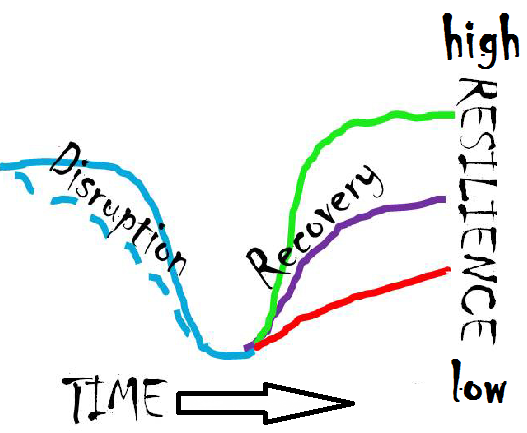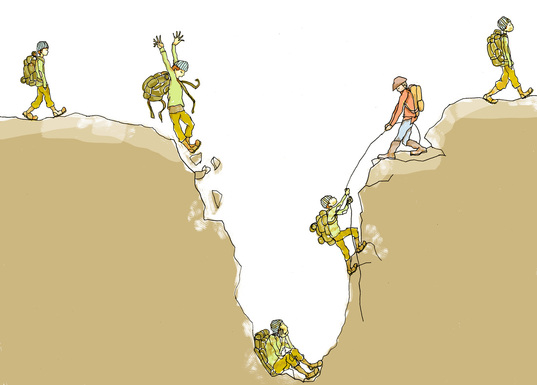
After spending a few minutes thinking about my own family and friends I concluded that our lives are full of disruption. Mostly small disruptions that we can skirt around by adapting plans, some a bit bigger that cause us to abandon or re-write plans and a few, that change the direction of our whole life.
In my adult life I have experienced several that caused me to abandon and re-write my life plan including - leaving the UK to work in a culture that was very different to my own and then eight years later leaving that country to start all over again in the UK, changing careers in my early 40's and then being made redundant from a job I liked two years later, the loss of my first wife to cancer and experiencing other serious illnesses within the family, and transitioning into that phase of life after fulltime employment that is called retirement. Looking around me I can see similar life-changing disruptions and stresses in the lives of my children, parents, siblings, relatives and friends.
Such life-changing disruptions upset life's routines and may, in some cases, erode or even destroy our identity, our family, our economic viability, our mental and physical wellbeing, our enjoyment and enthusiasm for life. In extreme cases they can make us want to give up on life altogether. Such disruptions breed uncertainty and anxiety and affect our relationships with people who are close to us. They are a test of our character, fortitude and resilience - our ability and will to fight back, move through and beyond a transition and progress into a different but more stable and sustainable existence.
Disruption is a fact of life, something we have to learn to cope with or we may become disabled by it. However uncomfortable, painful and difficult somehow we have to come to terms with the disruption - confront the new reality - and find a pathway to a different life. There is no turning the clock back: once it has happened we can only move on into a life that is different and mourn the loss and appreciate what we have and any opportunity we have been given.
Learning to cope with, move forward or 'bounce' back from disruptive is a lifelong - lifewide challenge: a challenge that is becoming more common in the Social Age as the speed of technological change forces people to change their career/work pathways more frequently.
Disruptions to our lives can occur at any time and can originate from many sources and an infinite number of personal circumstances. Significant life disruptions can be health related - serious illness including mental illness and loss of memory, and serious accidental injury, or the birth of a child with a disability, all of which can affect self or family members that impact on you. They can be related to the loss or disintegration of personal relationships - like the loss of a child, sibling, partner or parent, or the loss of a very close friend, and the splitting up and separation of partners and their families. Or from a child's perspective the loss of, or removal from, their parent(s) and being taken into care or being fostered.
They can be related to work especially the loss of a job, or serious stress within a job that causes someone to become unable to do their job. The loss of employment can lead to financial hardship which could spawn many more problems including going into debt or even the loss of a home.
For children, teenagers and young adults work equates with study at school, college and university and serious stress, bullying or significant academic failure can all result in the disruption of life.

A significant life disruption might be the result of a single event like birth, a stroke or a serious accident or it might result from a process in which events and circumstances coalesce - like stress at work leading poor performance and the loss of a job leading to financial hardship, serious debt and the eventual loss of a home, relationship problems and the splitting up of a family. These might seem like extreme scenarios but they illustrate how one sort of disruption or circumstance can grow into another and another.
All significant life disruptions affect the whole of life not just the future but all the parallel lives that are lived by an individual in the past and present. They may affect personal relationships, work, hobbies and interests and physical activities. They may impact on all the things we want and need to do in everyday life. Serious disruptions that affect our functioning and leave us disabled in some way reduce our lifewide experiences. In extreme cases - like hospitalisation through serious illness of injury, they reduce the identities we hold in different parts of our lives to a single identity and experience. Transition through a significant disruption may entail replacing our existing set of lifewide experiences with an entirely different set of lifewide experiences, developed in new contexts over a period of time.
All significant life disruptions result in loss of some aspects of our self which may cause manifestations of grief and the eventual rehabilitation and alteration of self. If the self wants to continue to live their life as fully as they are able, the self is required to go through a process in which a new self is created: a process that also requires the giving up of a former self. We define ourselves in terms of the relationships we have and serious disruptions will affect these so our loss of identity is compounded by the loss of the relationships that give our life meaning.
The extent to which individuals are able to rebuild their lives or reinvent themselves will of course be dependent on the individual, the cause and nature of the disruption and the individual's circumstances. The process of re-creation raises the issue of how do we recreate ourselves? How do we learn to be a different person in circumstances that are not our choosing? Some people have the agency and determination to extricate themselves from whatever has disrupted their life and move on to a new life by themselves. But often, situations become so complex that people need help to stabilize a situation and then to rebuild their life. Such help can take many forms - the support of spouses, children, parents, siblings, friends and employers, support from specialist services - like health and social care, public and voluntary sector agencies offering advice and support, and educational services that enable people to develop themselves, and increasingly in the Social Age - on-line communities and forums where people can gain support and advice from others who have had similar experiences and who are willing to share their personal knowledge to help others in need.
The issue of disruption is an important issue for lifewide learning because it creates new and significant demands and challenges for learning and development and sometimes completely reshapes our lives and who we are. Yet formal education steers well clear of disruption. In fact formal education tries to create an environment that is totally devoid of disruption. Perhaps such avoidance is not in the interests of young people who are preparing themselves for the rest of their lives in which they will have to learn to cope with all manner of disruptions.
Because we think it is important to consider the effects of disruption on people's lives we have devoted Issue 12 of Lifewide Magazine to exploring the ideas of disruption and resilience.In reading some of the contributions I was struck by how often the very idea of what learning means is questioned and challenged in the context of disruptive life change. It often comes down to 'learning to be' all over again. Having spent a lifetime learning to be someone, serious disruption can cause us to start learning to be an entirely different person. We often talk about education enabling people to reach their full potential. But what if that potential is taken away from you during course of your life and replaced by a different potential? I am curious to know how our education systems might help develop people so that they are better able to cope with such profound and disturbing realities.
TO EXPLORE THESE IDEAS FURTHER PLEASE READ ISSUE 12 LIFEWIDE MAGAZINE
 RSS Feed
RSS Feed
